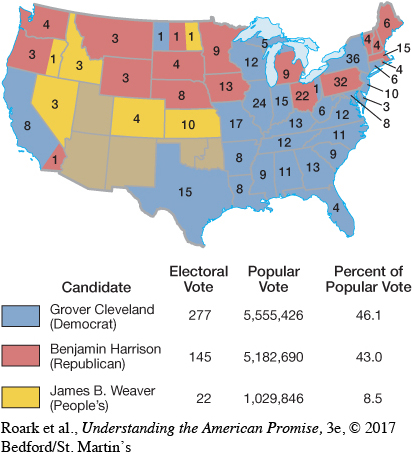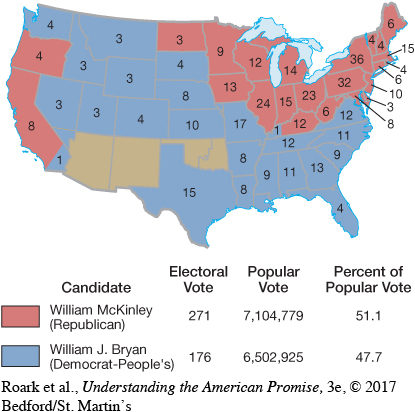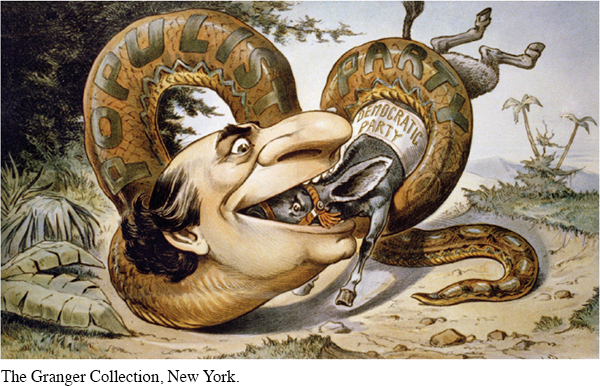The People’s Party and the Election of 1896
Even before the depression of 1893, the Populists had railed against the status quo. “We meet in the midst of a nation brought to the verge of moral, political, and material ruin,” Ignatius Donnelly had declared in his keynote address at the creation of the People’s Party in St. Louis in 1892. “The fruits of the toil of millions are boldly stolen to build up colossal fortunes for a few. . . . From the same prolific womb of governmental injustice we breed the two great classes—tramps and millionaires.”
The fiery rhetoric frightened many who saw in the People’s Party a call not to reform but to revolution. Throughout the country, the press denounced the Populists as “cranks, lunatics, and idiots.” When one self-righteous editor dismissed them as “calamity howlers,” Populist governor Lorenzo Lewelling of Kansas shot back, “If that is so I want to continue to howl until those conditions are improved.”

The People’s Party captured more than a million votes in the presidential election of 1892, a respectable showing for a new party (Map 20.1). But increasingly, sectional and racial animosities threatened its unity. Realizing that race prejudice obscured the common economic interests of black and white farmers, Populist Tom Watson of Georgia openly courted African Americans, appearing on platforms with black speakers and promising “to wipe out the color line.” When angry Georgia whites threatened to lynch a black Populist preacher, Watson rallied two thousand gun-toting Populists to the man’s defense. Although many Populists remained racist in their attitudes toward African Americans, the spectacle of white Georgians riding through the night to protect a black man from lynching was symbolic of the enormous changes the Populist Party promised in the South. [[LP Map: M20.01 The Election of 1892/
As the presidential election of 1896 approached, the depression intensified cries for reform not only from the Populists but also throughout the electorate. Depression worsened the tight money problem caused by the deflationary pressures of the gold standard. Once again, proponents of free silver stirred rebellion in the ranks of both the Democratic and the Republican parties. When the Republicans nominated Ohio governor William McKinley on a platform pledging the preservation of the gold standard, western advocates of free silver representing miners and farmers walked out of the convention. Open rebellion also split the Democratic Party as vast segments in the West and South repudiated President Grover Cleveland because of his support for gold. In South Carolina, Benjamin Tillman won his race for Congress by promising, “Send me to Washington and I’ll stick my pitchfork into [Cleveland’s] old ribs!”
The spirit of revolt animated the Democratic National Convention in Chicago in the summer of 1896. William Jennings Bryan of Nebraska, the thirty-six-year-old “boy orator from the Platte,” whipped the convention into a frenzy, calling passionately for free silver with a ringing exhortation: “Do not crucify mankind upon a cross of gold.” Pandemonium broke loose as delegates stampeded to nominate Bryan, the youngest candidate ever to run for the presidency.
The juggernaut of free silver rolled out of Chicago and on to St. Louis, where the People’s Party met a week after the Democrats adjourned. Many western Populists urged the party to ally with the Democrats and endorse Bryan. A major obstacle in the path of fusion, however, was Bryan’s running mate, Arthur M. Sewall. A Maine railway director and bank president, Sewall, who had been placed on the ticket to appease conservative Democrats, embodied everything the Populists detested. Moreover, die-hard southern Populists wanted no part of fusion. Southern Democrats had resorted to fraud and violence to steal elections from the Populists in southern states, and support for a Democratic ticket proved hard to swallow.
> CONSIDER CAUSE
AND EFFECT
What factors were primarily responsible for the demise of the Populist Party after 1896?
Populists struggled to work out a compromise. To show that they remained true to their principles, delegates first voted to support all the planks of the 1892 platform, added to it a call for public works projects for the unemployed, and only narrowly defeated a plank for woman suffrage. To deal with the problem of fusion, the convention selected the vice presidential candidate first. The nomination of Tom Watson undercut opposition to Bryan’s candidacy. And although Bryan quickly sent a telegram to protest that he would not drop Sewall as his running mate, mysteriously his message never reached the convention floor. Fusion triumphed. Bryan won nomination by a lopsided vote. The Populists did not know it, but their cheers for Bryan signaled the death knell for the People’s Party.

Few contests in the nation’s history have been as fiercely fought as the presidential election of 1896. On one side stood Republican William McKinley, backed by the wealthy industrialist and party boss Mark Hanna. Hanna played on the business community’s fears of Populism to raise a Republican war chest more than double the amount of any previous campaign. On the other side, William Jennings Bryan, with few assets beyond his silver tongue, struggled to make up in energy and eloquence what his party lacked in campaign funds. He crisscrossed the country in a whirlwind tour, by his own reckoning visiting twenty-seven states and speaking to more than five million Americans.
On election day, four out of five voters went to the polls in an unprecedented turnout. The silver states of the Rocky Mountains lined up solidly for Bryan. The Northeast went for McKinley. The Midwest tipped the balance. In the end, the election hinged on between 100 and 1,000 votes in several key states, including Wisconsin, Iowa, and Minnesota. Although McKinley won twenty-three states to Bryan’s twenty-two, the electoral vote showed a lopsided 271 to 176 in McKinley’s favor (Map 20.2).[[LP Map: M20.02 The Election of 1896/
[[LP Photo: P20.08 “Swallowed!”/

The biggest losers in 1896 turned out to be the Populists. On the national level, they polled fewer than 300,000 votes, a million less than in 1894. In the clamor to support Bryan, Populists in the South, determined to beat McKinley at any cost, swallowed their differences and drifted back to the Democratic Party.
> QUICK REVIEW
Why was the People’s Party unable to translate national support into victory in the 1896 election?
Understanding the American Promise 3ePrinted Page 571
Section Chronology